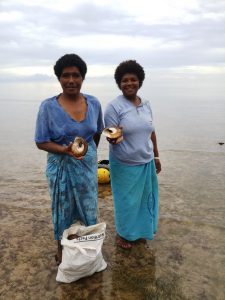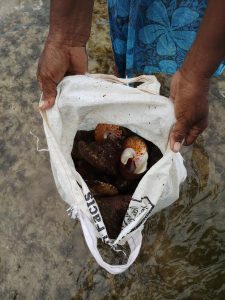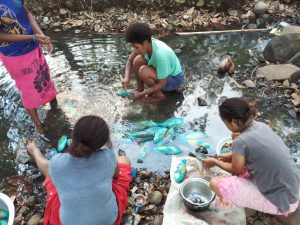By Ulamila L. Matairakula; PBF’s Environmental Officer
We grew up playing the famous tongue twister – She sells seashells at the seashore! Today, I ponder at that sentence and realize that it is more than a tongue twister. The woman you see selling seashells along the seashore, roadside or in the market, is someone’s mother or

grandmother and they’ve got their own story of the little sacrifices they do to provide for their family.
Women’s roles in the fisheries sector need more recognition and acknowledgement. Many times, from a cultural and social perspective, community stereotype women to have defined roles, limiting their ambitions and capabilities. Women are more likely to work close to home with traditional roles from primary care givers, household managers, farmers, to the woman that sells seashells at the seashore. They say, there is not a job a woman cannot do!

In most places, men are more likely to practice diving and spear fishing targeting deeper water fish or are mostly involved in fishing on large vessels using specialized gears for commercial purposes; whereas women practice small-scale fisheries using various fishing gears and methods such as line and net fishing, woven baskets, and gleaning. Hence, these differences may assist in the exclusion of women from having a seat at the decision-making table in the fisheries sector. But women are present throughout the fisheries value chain from catching, processing, distribution to marketing.
Women have worked hard over the years for their voices to be heard. Today, they’re marine scientists, community leaders and ocean stewards. A study by the United Nations Food and Agriculture Organization (FAO) stated that 70% of the aquaculture workforce is actually women, playing key roles in fishing, processing, and marketing. The study further states, in the Pacific alone, women account for 56% of annual small-scale catches!

In April 2021, the Pacific Community (SPC) coordinated the 14th Triennial Conference of the Pacific Women and the 7th Meeting of the Pacific Ministers for Women, hosted by French Polynesia. The conference brought together decision-makers, development partners, research institutions and civil society organizations. At the conference, member of the founding Coordination Council of the Locally Managed Marine Area (LMMA) Network, Dr Alifereti Tawake stated: “Women should be involved in ocean management because they bring motherly care, motherly instincts and deep-rooted knowledge of ocean and ocean governance.”
In the fisheries sector, there is a need, and indeed a challenge to have gender inclusion and equality. Having women representatives as decision makers gives women at grassroot levels a chance to be heard and recognized for their contribution and roles to the fisheries sector.
Times have changed, we need not to narrowly define women’s roles whether it be in civil society organisations, communities or in our own homes. We need to work together through gender inclusion and equality to share knowledge, ideas and experiences to combat climate change and local pressures, and build a resilient and sustainable future for the people and the environment alike.


